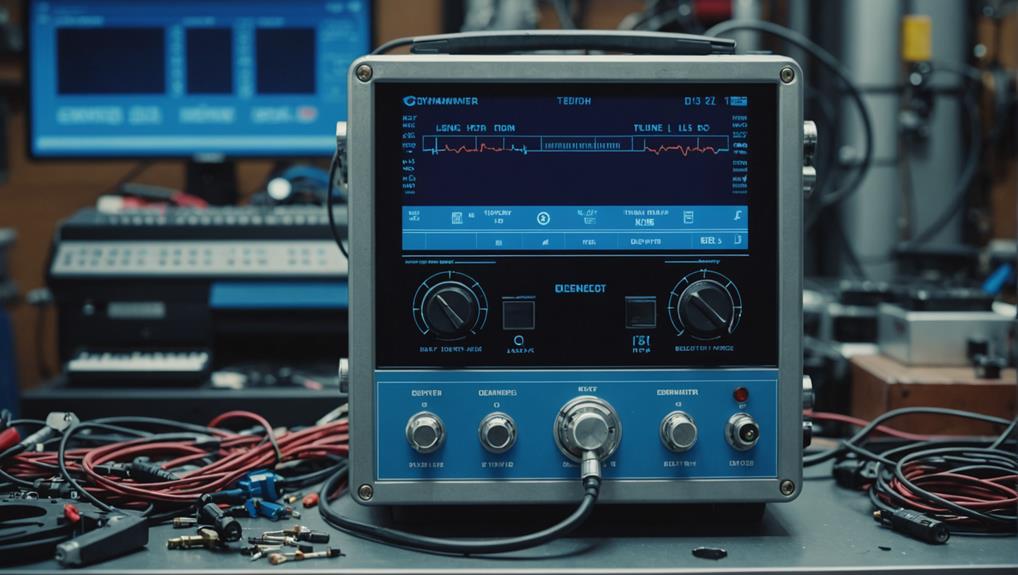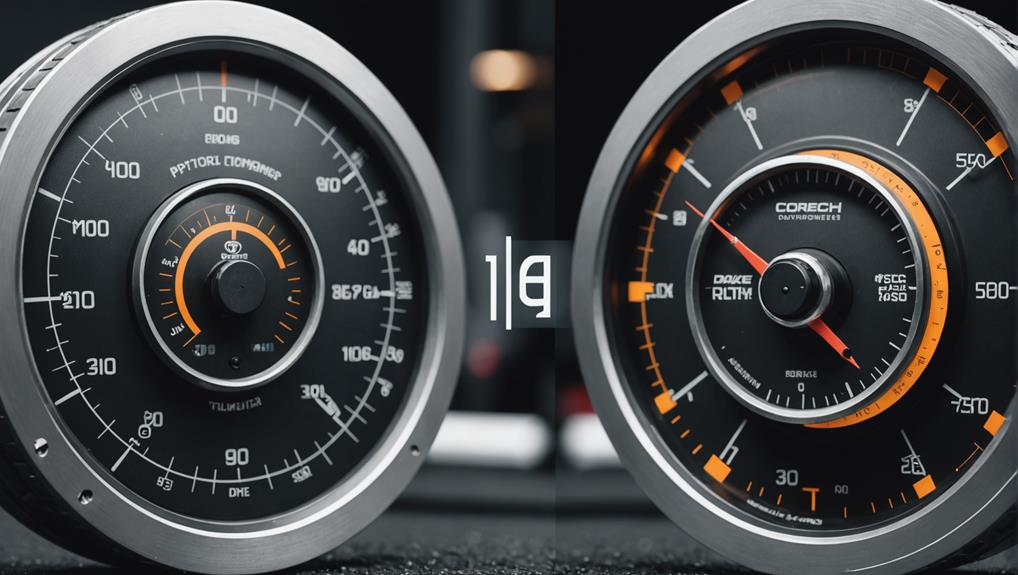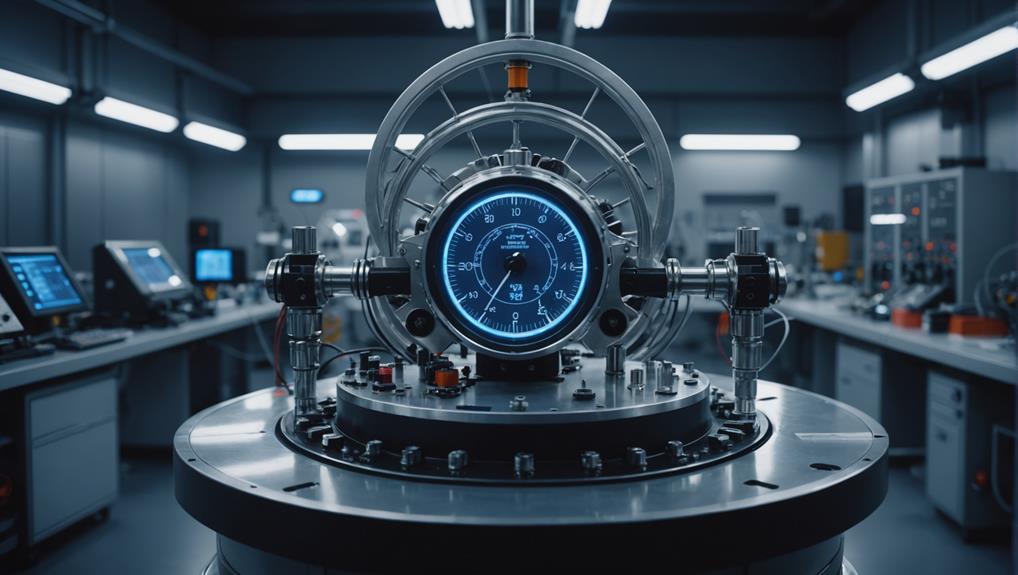
How Dynamometers Enhance Engine Diagnostics and Testing
Necessitating precise measurements, dynamometers unlock the secrets of engine performance, but what else can they reveal about engine diagnostics and testing?
Precision is crucial for accurate engine performance assessments when using Hyper Power dynamometers. These dynamometers set high standards by verifying their claimed horsepower with a 1% accuracy margin.
Factors such as temperature and fuel quality can affect accuracy, so attention to detail is key. Vehicle specifications, tuning products, and traction also impact results. Fine-tuning can enhance accuracy by customizing adjustments to suit driver preferences.
To explore further the precision of Hyper Power dynamometers, consider how traction control systems and advanced technology contribute to achieving consistent outcomes for top-notch tuning results.
Factors Influencing Dynamometer Precision
Various factors significantly impact the accuracy of dynamometer readings, including atmospheric conditions, type of dynamometer used, and the quality of gas utilised during testing. The choice of dynamometer is crucial when it comes to engine dyno testing. Whether opting for an eddy current dyno or an acceleration dyno, each type has its own strengths and weaknesses that can affect the precision of the results. Manufacturers such as Mustang, Dynojet, and Superflow offer a range of dynamometer models, and these differences can result in variations in the data produced. Moreover, the quality of the fuel used during testing plays a pivotal role in determining the accuracy of dynamometer readings. It is essential to consider all these factors when analysing the outcomes of an engine dyno test to ensure the data obtained is as accurate and reliable as possible.
Recommendation for Dynamometer Quality
When selecting a dynamometer for engine testing, it is vital to choose a high-quality model from reputable manufacturers like Superflow, Dynojet, or Mustang. For instance, Superflow offers a range of dynamometer models known for their accuracy and reliability in capturing precise data during testing. Investing in a top-quality dynamometer can significantly enhance the accuracy of engine performance measurements, leading to more reliable results and informed decision-making in vehicle tuning and development processes.
Significance of Gas Quality in Dynamometer Testing
The quality of the gas used in dynamometer testing is a critical factor that can impact the accuracy of the results obtained. Using high-grade, clean fuel without impurities or inconsistencies is essential to ensure reliable and consistent measurements during engine testing. For instance, using a premium-grade fuel recommended by the dynamometer manufacturer can help maintain the accuracy of the readings and prevent any inaccuracies that may arise from using substandard fuel. Therefore, paying attention to the quality of gas used during dynamometer testing is key to obtaining precise and trustworthy data for engine performance evaluation.
Importance of Ambient Conditions in Testing
In engine dyno testing, the accuracy of dynamometer results heavily relies on ambient conditions like temperature, barometric readings, and humidity levels. These factors can significantly impact power output readings, leading to skewed results if not taken into consideration. For instance, variations in air temperature and pressure can distort the outcomes, emphasising the need to account for these conditions during testing. To ensure fairness, STP correction factors are utilised to adjust dyno results based on ambient conditions, maintaining accuracy and consistency.
The role of temperature, barometric readings, and humidity levels in engine performance and power output measurements during dyno testing cannot be underestimated. Monitoring and controlling these ambient conditions are crucial for obtaining reliable and consistent results. For example, high humidity levels can affect engine performance, influencing the power output readings. By paying attention to these ambient conditions, testers can enhance the accuracy and credibility of dyno testing outcomes.
Specific Examples and Product Recommendations:
Vehicle weight, engine type, and tire size are important factors that can greatly impact the results obtained from Hyper Power dynamometers. Grasping how these specifications influence the dyno readings is vital for accurately interpreting the data.
Impact of Vehicle Weight on Hyper Power Dynamometer Measurements
The weight of a vehicle can significantly influence the accuracy of power readings on a Hyper Power dynamometer. Heavier vehicles typically experience higher drivetrain losses, leading to potential inaccuracies in the power measurements obtained from the dynamometer. Understanding this impact is crucial as vehicle weight plays a key role in determining important performance indicators such as power-to-weight ratio and overall efficiency. Hyper Power dynamometers take the vehicle's weight into account when calculating power output and drivetrain efficiency, ensuring precise assessment of the vehicle's performance capabilities.
Importance of Considering Vehicle Weight in Dyno Testing
When conducting dynamometer tests, the weight of the vehicle is a critical factor that can affect the accuracy of the results. For instance, a heavier vehicle may exhibit higher resistance and increased energy losses during power measurements, leading to skewed data. Understanding how vehicle weight influences dyno results is essential for evaluating performance accurately and making informed decisions for vehicle modifications or tuning. By accounting for the vehicle's weight, Hyper Power dynamometers provide more reliable and realistic data for performance analysis.
Significance of Power-to-Weight Ratio in Performance Evaluation
The power-to-weight ratio is a fundamental metric used to assess a vehicle's performance capabilities. It indicates how much power is available for each unit of weight, reflecting the vehicle's acceleration and overall agility. For example, a high power-to-weight ratio signifies a more powerful vehicle that can accelerate quickly and handle better. By factoring in the vehicle's weight during dynamometer testing, Hyper Power dynamometers enable accurate calculation of the power-to-weight ratio, aiding in performance evaluation and comparison with other vehicles.
Benefits of Enhanced Drivetrain Efficiency Measurements
Drivetrain efficiency is another crucial aspect that can be influenced by the weight of the vehicle during dynamometer testing. Heavier vehicles may experience higher losses in the drivetrain, affecting overall efficiency and performance. By considering the vehicle's weight, Hyper Power dynamometers provide insights into drivetrain efficiency, helping identify areas for improvement and optimisation. This information is valuable for manufacturers, tuners, and enthusiasts looking to enhance the vehicle's performance and efficiency.
Engine Type Variability Impact on Dyno Testing
Does the variation in engine types significantly affect the results of dynamometer tests due to differences in specifications such as displacement, compression ratio, and forced induction? When conducting tests on a rolling road dynamometer, the type of engine used plays a crucial role in determining the outcomes.
Various ways in which engine type differences can influence the dyno readings include:
These diverse characteristics among engine types can lead to varying performance results on a rolling road dynamometer, underscoring the significance of considering engine specifications during testing.
Impact of Tyre Size
The precision of Hyper Power Dynamometers remains consistent regardless of variations in tyre size, ensuring accurate power readings for a diverse range of vehicles. Whether your car is equipped with stylish low-profile tyres or robust all-terrain ones, the power output measurements from Hyper Power Dynamometers remain reliable.
This means you can have confidence in the results displayed, knowing that your vehicle's performance is effectively captured regardless of the tyre specifications. The advanced technology incorporated in these dynamometers considers factors such as tyre size to deliver precise power measurements.
When you use the dynamometer with your vehicle, you can trust that the numbers accurately reflect your vehicle's power output, enabling you to confidently compare and enhance your performance.
Comparison Testing With Different Tuning Products
During the comparison testing with various tuning products, the performance enhancements from each tuning company were thoroughly assessed. When scrutinising the tuning products on the dynamometer, a few key observations emerged:
These findings underscore the complexities involved in comparing tuning products and underscore the significance of a meticulous analysis to determine the most suitable option for optimal performance.
Relevance of Testing in Performance Tuning Comparison
During the evaluation of different tuning products, key considerations emerged regarding the relevance of the tests conducted. In the realm of performance testing, it is crucial to ensure that the results obtained can be applied in real-world situations. When analysing the assessments carried out on the 2006 Nissan Titan with a 5.6L V8 engine, it is important that the data not only showcases increased power but also illustrates how these enhancements translate into everyday driving scenarios. This raises queries about the practicality of the observed improvements in controlled settings. Understanding how tuning products fare in real-world conditions, considering varying factors like weather and driving habits, is vital for consumers interested in upgrading their vehicles. By assessing the relevance of these tests to everyday driving experiences, a more comprehensive understanding of the actual advantages offered by these tuning products to drivers seeking enhanced performance can be provided.
Significance of Real-World Performance
The performance of a vehicle in day-to-day driving situations is a crucial factor for many consumers when considering tuning products. For instance, knowing how an engine tuning chip not only increases horsepower on a dyno test but also enhances acceleration during overtaking on a motorway is invaluable information. This real-world performance data can greatly influence a driver's decision when investing in a tuning product, as it directly impacts their driving experience.
Importance of Varied Driving Conditions
The ability of tuning products to perform consistently across different driving conditions is paramount. For example, a suspension upgrade that improves handling on both smooth tarmac and rough off-road terrain would be highly desirable for drivers seeking versatility in their vehicle's performance. Understanding how tuning products adapt to various road conditions ensures that consumers make informed decisions based on their specific driving needs and preferences.
Relevance of Long-Term Performance
Long-term performance evaluation of tuning products is essential to determine their durability and reliability over time. For instance, a high-flow air intake system that provides increased horsepower initially but deteriorates quickly due to poor build quality would not be a wise investment. Examining the long-term performance of tuning products gives consumers insight into the overall value and longevity of the upgrades, helping them choose products that offer sustained benefits over time.
In regards to dyno testing, having access to detailed torque information is essential for grasping the true performance capabilities of an engine.
By examining torque precision and comparing accuracy across different dynamometers, enthusiasts and professionals can make informed decisions on tuning and optimization strategies.
The ability to explore specific torque figures allows for a deeper evaluation of power delivery dynamics and aids in fine-tuning engines for peak performance.
Understanding the Significance of Detailed Torque Data
Recognising the critical role of precise torque information is essential in the realm of engine performance enhancement. When it comes to torque accuracy, every detail is crucial for achieving optimal performance.
Here are three key reasons why detailed torque data holds importance:
Accuracy Comparison Analysis
When dynamometers factor in specific torque data, it enhances the precision of power measurement comparisons, facilitating a more comprehensive assessment of power gains and performance enhancements.
Access to detailed torque information proves invaluable in comprehending power delivery dynamics, enabling a more precise evaluation of tuning impacts on engine performance.
The inclusion of comprehensive torque data in dynamometer test outcomes ensures transparency and enables a more accurate analysis of power output.
Therefore, for enthusiasts seeking precise and dependable information on power metrics, incorporating detailed torque information is crucial when assessing the effectiveness of high-performance dynamometers.
Concerns About Tuning Process
The tuning process for hyper power dynamometers involves intricate timing adjustments and precise AFR tweaks to optimize performance modifications. When considering concerns about the tuning process, it's vital to consider the following:
Navigating the tuning process can be challenging, but with the right guidance and attention to detail, enthusiasts can unlock the full potential of their vehicles. Remember, precision and patience are crucial when aiming to enhance your vehicle's performance through tuning.
Ensuring optimal traction is like laying a solid foundation for accurate dyno testing.
By focusing on improving tire grip, we pave the way for precise power measurements on Hyper Power Dynamometers.
Consistent traction levels are key to reliable data and trustworthy performance evaluations.
Importance of Traction in Dynamometer Testing
In dynamometer testing, traction plays a vital role in ensuring accurate and consistent results. It is essential for transferring the power generated by the engine to the dyno, which directly impacts the precision of the testing outcomes. Inadequate traction can result in fluctuations in power measurements, compromising the evaluation of a vehicle's performance. Factors like tire grip, tire temperature, and wheel slippage are crucial in maintaining steady traction during dyno tests. By ensuring optimal traction, reliable data for tuning and comparisons can be obtained, enhancing the overall accuracy of dyno results.
Specific Examples and Product Recommendations:
Importance of Consistent Traction for Dyno Testing Accuracy
Consistent traction is paramount for achieving precise and reliable results in dynamometer testing. It ensures that the power produced by the engine is efficiently transmitted to the dynamometer, which is crucial for obtaining accurate performance data. Without consistent traction, fluctuations in power readings can occur, leading to inaccuracies in the evaluation of a vehicle's capabilities. Factors like tire grip, tire temperature, and wheel slippage must be carefully managed to uphold consistent traction during dyno testing, ultimately enhancing the reliability of the results obtained.
Specific Examples and Product Recommendations:
Enhancing Traction for Precision
Enhancing traction plays a crucial role in improving the accuracy of dynamometer testing results. When testing powerful vehicles such as the Nissan GT-R on a Hyper Power Dyno, traction is paramount. Insufficient grip can cause the tires to slide, resulting in inaccurate power readings. To ensure precise measurements, maintaining optimal tire grip throughout the testing is vital. The use of traction control systems can aid in achieving consistent and dependable outcomes, especially when dealing with high-performance vehicles like the GT-R. The accuracy of the Hyper Power Dyno hinges on the right traction conditions to deliver exact power data, underscoring the significance of traction enhancement in obtaining reliable results during dyno testing.
Utilising Traction Control Systems for Consistency
In dyno testing, employing traction control systems is essential for maintaining consistency in power measurements. These systems help in managing wheel spin and maintaining traction, which is crucial for accurate results. For example, the GT-R's advanced traction control system ensures that power delivery to the wheels is optimised, preventing slippage and ensuring precise readings on the dyno. By utilising such systems, testers can enhance the accuracy of their testing and trust the data obtained from the dyno runs.
Importance of Optimal Tire Grip
Optimal tire grip is fundamental in ensuring accurate power measurements during dyno testing. For instance, using high-performance tires with excellent traction properties can significantly improve the reliability of the results. These tires provide better grip on the dyno rollers, reducing slippage and enhancing the accuracy of power readings. Therefore, investing in quality tires that offer superior traction can greatly benefit the testing process and lead to more precise and trustworthy data.
Personalised Tuning for Precision
A tailored method of tuning on a Hyper Power dynamometer ensures precise adjustments customised to suit the specific needs of each vehicle. This personalised approach guarantees that the tuning process is optimised to enhance the individual characteristics of every car, leading to enhanced performance and efficiency.
When it comes to accuracy in tuning, Hyper Power dynamometers stand out in providing the essential tools for achieving top-notch results. Here are three key advantages of personalised tuning on a Hyper Power dynamometer:
Enhancing Precision and Reliability
Enhancing accuracy and dependability in power measurement and evaluation, Hyper Power dyno technology sets a high standard for precision within the automotive industry. By aiming to compare manufacturer claimed horsepower and torque within a 1% accuracy range, Hyper Power dyno technology ensures that car enthusiasts and professionals can have confidence in the results they receive.
Independent tests verifying the precision of these measurements before regular use further establish Hyper Power dyno technology's reputation for reliability. Moreover, the dyno's ability to accurately measure driveline losses improves the precision of power assessments by offering a detailed breakdown of power distribution between the engine and the wheels.
With its advanced measurement tools and similarity to a standard four-wheel chassis dyno, Hyper Power International's dyno technology provides an unparalleled level of precision in the industry. For individuals seeking accurate and reliable power measurements for their vehicles, Hyper Power dyno technology emerges as a dependable and valuable resource.
In essence, hyper power dynamometers can offer precise results when factors like ambient conditions, vehicle specifications, and tuning processes are carefully considered. By focusing on traction and personalised tuning, accuracy and reliability can be improved. It is essential to conduct comparison testing with different tuning products to ensure the most precise results. Overall, paying attention to these key factors can help guarantee the accuracy of hyper power dynamometers in testing different vehicles.
Contact Hyper Dyno if you have any questions about Dynamometer Products, Custom Solutions, Installation Setup, Training and Certification, Technical Support and Maintenance, Software Updates, Rental Services, Dynamometer Testing Services and Accessories and Parts.

Necessitating precise measurements, dynamometers unlock the secrets of engine performance, but what else can they reveal about engine diagnostics and testing?

Navigating the complexities of torque measurement requires a deep understanding of the underlying principles and mechanisms to ensure accurate results.

Precise control and optimization of engine performance await, but only for those who unlock the secrets of dynamometer-driven data analysis.

Gaining insight into the differences between inertia and brake dynamometers is crucial for ensuring accurate testing results in various industries.

Tapping into the precise measurement capabilities of dynamometers, uncover the secrets to optimizing fuel efficiency and slashing emissions in the automotive industry.

Witness the importance of rigorous safety protocols and best practices in dynamometer testing to avoid catastrophic failures and ensure accurate results.

Harnessing the nuances of precision measurement is crucial to avoiding costly errors in dynamometer testing, but what are the key factors to consider?

Witness the transformative power of dynamometers in unlocking your vehicle’s hidden performance potential, but only if you know how to harness their precision.